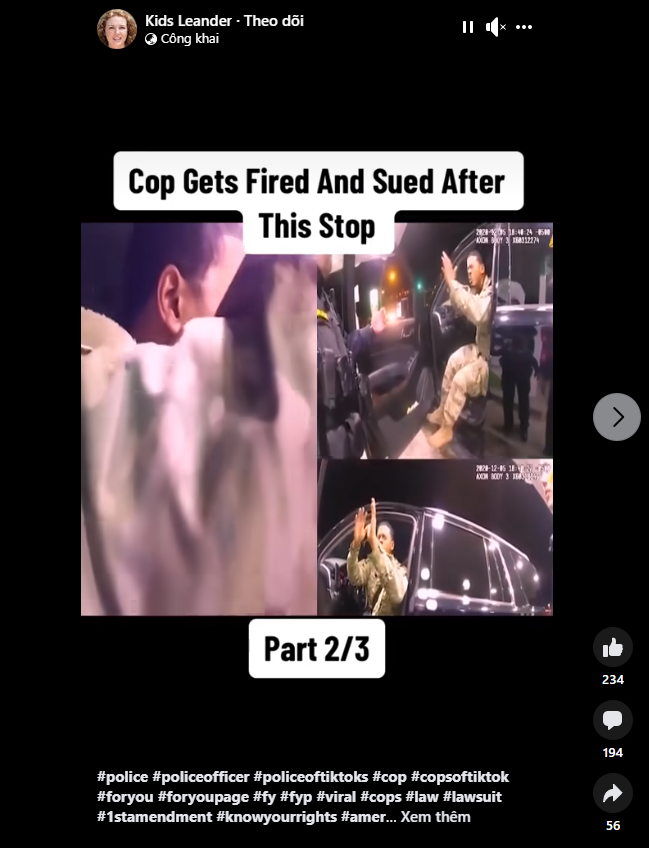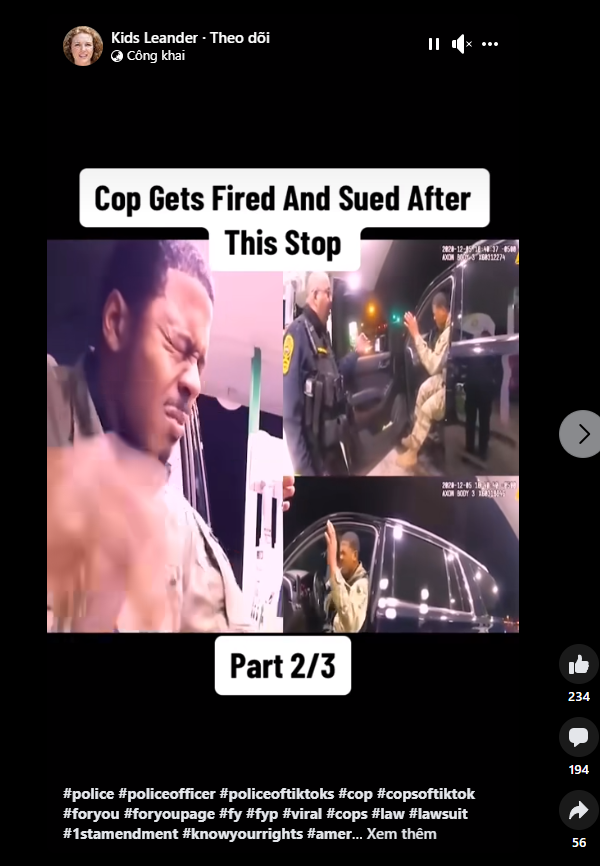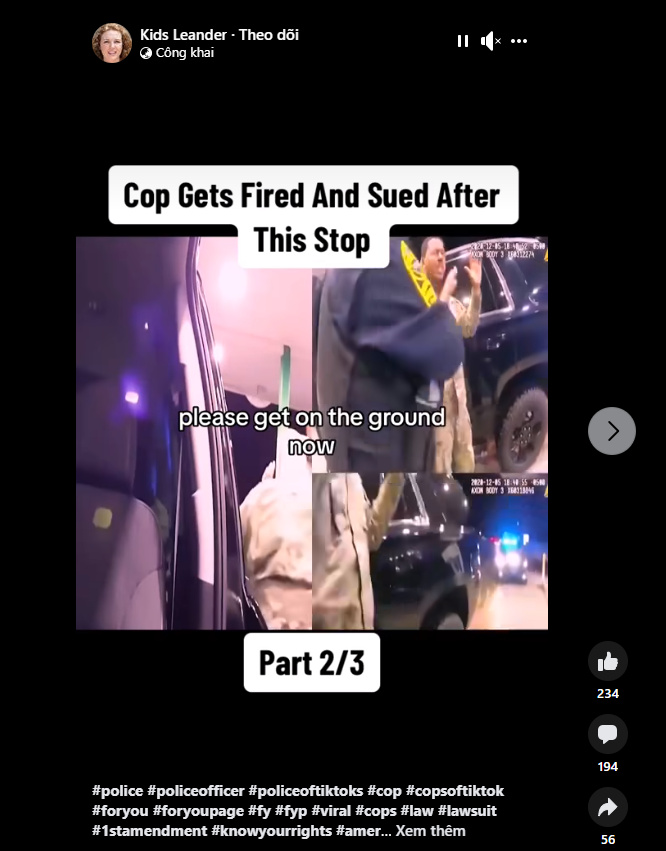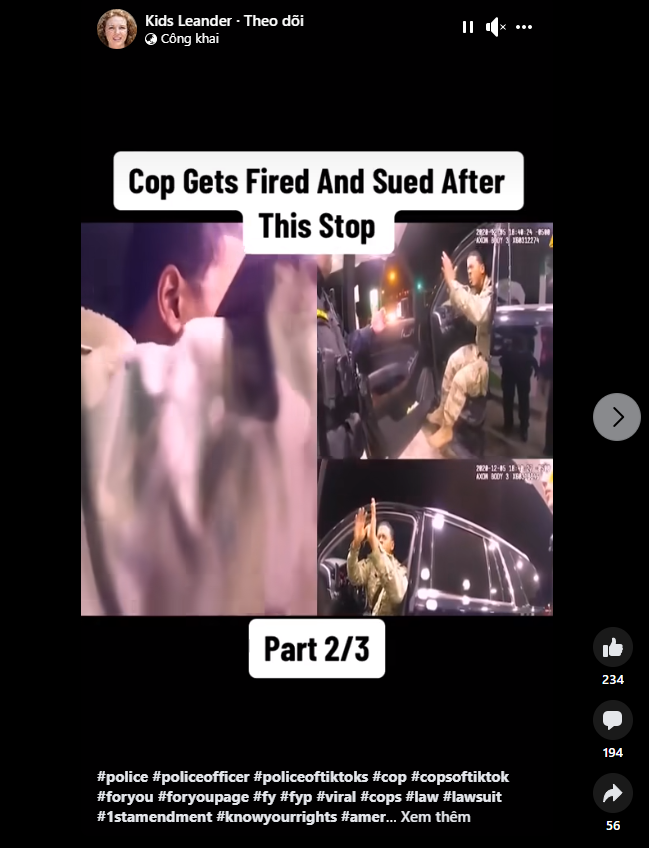NEXT PART AT THE END OF THE ARTICLE
The comments provided reflect a range of perspectives and emotions regarding law enforcement. It’s important to acknowledge the diversity of opinions on this complex issue.
The term “bastard” and the mention of a “tyrant cop” reflect deep frustration and anger towards some law enforcement officers. Instances of police misconduct or abuse of power can erode trust in the entire profession, leading to strong condemnations.
The call to “keep recording” underscores the role of citizen engagement and the importance of transparency in law enforcement. Recording interactions with police can serve as a tool for accountability and ensuring that officers adhere to their training and the law.
The comment that “there’s no such thing as a good cop” reflects a sentiment held by some individuals who believe that systemic issues within policing can overshadow the actions of well-intentioned officers. It highlights the need for systemic reform and addressing concerns about the behavior of a few affecting the reputation of all.

Addressing concerns and perspectives on policing is an essential step towards fostering a more just and equitable society. The comments provided reflect a wide range of perspectives and emotions regarding law enforcement. It’s crucial to acknowledge the diversity of opinions on this complex issue and engage in constructive dialogue to bridge gaps, build understanding, and pave the way for meaningful change.
Reflecting on Frustration and Anger:
The term “bastard” and the mention of a “tyrant cop” in some comments reflect deep frustration and anger towards some law enforcement officers. Instances of police misconduct or abuse of power can erode trust in the entire profession, leading to strong condemnations. It’s important to recognize that these emotions stem from real experiences of injustice and inequality that some individuals have faced.
The Role of Accountability:
Accountability is a cornerstone of a just and effective policing system. When incidents of misconduct occur, it is essential that they are thoroughly investigated, and those responsible are held accountable. Failure to do so can perpetuate feelings of frustration and anger, eroding public trust further. Recognizing the importance of accountability is a step towards addressing these concerns.

A Plea for Change:
Many of the comments also convey a plea for change within law enforcement. These voices are advocating for reforms that promote transparency, equity, and community-oriented policing. They underscore the need for law enforcement agencies to reflect the values and expectations of the communities they serve. Such calls for change should not be dismissed but rather seen as opportunities to enhance the effectiveness and fairness of policing.
The Diversity of Policing Experiences:
It’s important to acknowledge that perspectives on policing are diverse and multifaceted. While some individuals have had negative encounters with law enforcement, others have had positive interactions that have instilled a sense of safety and trust. Policing experiences can vary widely based on factors such as location, socioeconomic status, race, and personal history. Recognizing this diversity helps us appreciate the complexity of the issue.
Building Trust through Community Policing:
Community-oriented policing, which emphasizes collaboration and engagement with the community, is one approach to address concerns about law enforcement. Building trust between officers and community members can help bridge divides and create a more harmonious relationship. Initiatives that encourage dialogue, community involvement, and transparency can go a long way in fostering mutual understanding.

The Role of Education and Training:
To address concerns and perspectives on policing comprehensively, it’s crucial to consider the role of education and training within law enforcement agencies. Many concerns stem from a lack of understanding of police procedures, laws, and the challenges officers face. Proper education and training can bridge this gap by providing officers with the knowledge and skills needed to navigate complex situations while upholding the rights and dignity of all individuals.
Moreover, training programs that emphasize de-escalation techniques, cultural sensitivity, and conflict resolution can help reduce incidents of excessive force and misconduct. Investing in ongoing education and training is an investment in building a more professional and accountable law enforcement community.
Community Policing and Trust-Building:
Community policing, as mentioned earlier, holds great promise in addressing concerns about law enforcement. This approach prioritizes building positive relationships between officers and the communities they serve. It encourages officers to be active participants in their communities, working collaboratively to solve problems and prevent crime.
By engaging with community members, law enforcement can gain valuable insights into local issues and concerns. This interaction fosters trust and mutual respect, which are essential for effective policing. Community policing initiatives can range from regular town hall meetings to youth outreach programs, all aimed at strengthening the bond between law enforcement and the public.
Transparency and Accountability Mechanisms:
Transparency and accountability are critical components in addressing concerns about law enforcement. Establishing robust oversight mechanisms, such as civilian review boards, can help ensure that complaints of misconduct are thoroughly investigated and that officers are held accountable for their actions.
Body-worn cameras and dashboard cameras can provide crucial evidence in cases of alleged misconduct, promoting transparency and serving as a tool for accountability. Public access to police department policies and procedures can also enhance transparency, allowing citizens to understand how law enforcement agencies operate.
Legislative Reforms:
Addressing concerns and perspectives on policing often requires legislative reforms that reflect the evolving needs and expectations of society. These reforms may include changes to use-of-force policies, limitations on the use of military equipment by law enforcement, and measures to address systemic issues like racial profiling.
Efforts to reform laws and regulations should involve input from a broad spectrum of stakeholders, including community members, civil rights organizations, law enforcement agencies, and lawmakers. Legislation should aim to strike a balance between ensuring public safety and protecting the rights and dignity of all individuals.

Conclusion: A Path Forward through Collaboration:
To address concerns and perspectives on policing, collaboration is essential. Law enforcement agencies, communities, and policymakers must work together to build a system that is fair, just, and accountable. By focusing on education and training, community policing, transparency, accountability, and legislative reforms, we can create a policing environment that aligns with the values of our diverse and dynamic society. It is through collective efforts and open dialogue that we can move toward a future where policing serves as a beacon of safety, trust, and justice for all.
Lastly, the mention of an incident involving a Hispanic service member and a Hispanic cop illustrates how issues of bias and bigotry can manifest within law enforcement. It emphasizes the importance of addressing implicit biases and fostering diversity and inclusion within police departments.
The comments reveal a diverse range of perspectives on policing, from anger and frustration to calls for accountability and reform. Meaningful dialogue and proactive steps are crucial to address concerns and build trust between law enforcement agencies and the communities they serve. Balancing the need for safety and justice while upholding individual rights remains an ongoing challenge in the realm of law enforcement.
https://www.facebook.com/reel/3245573675734208

